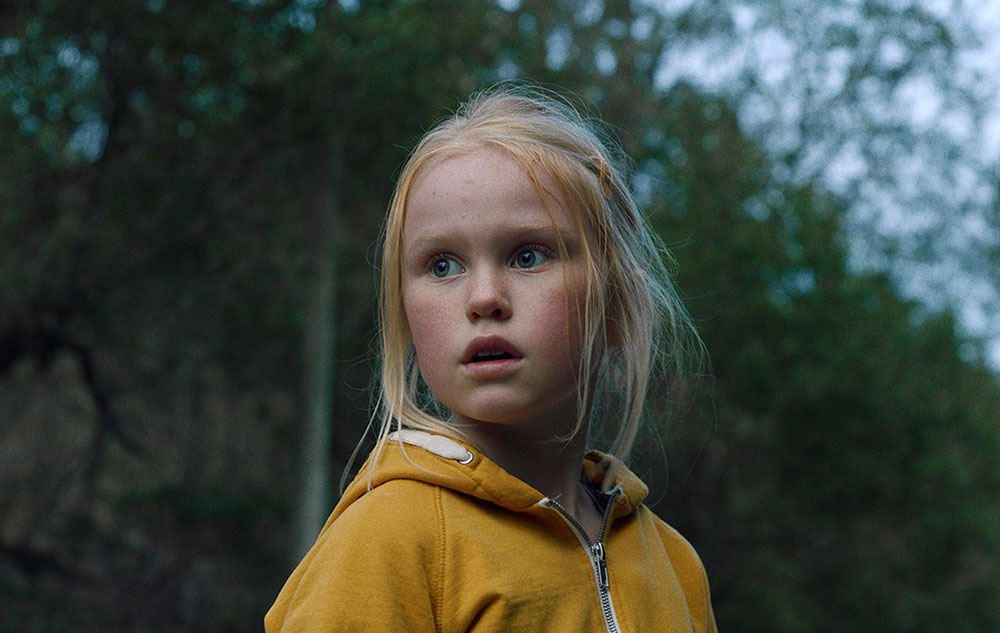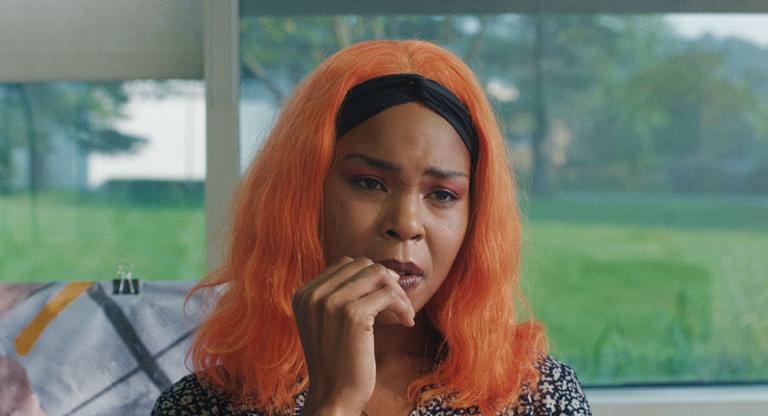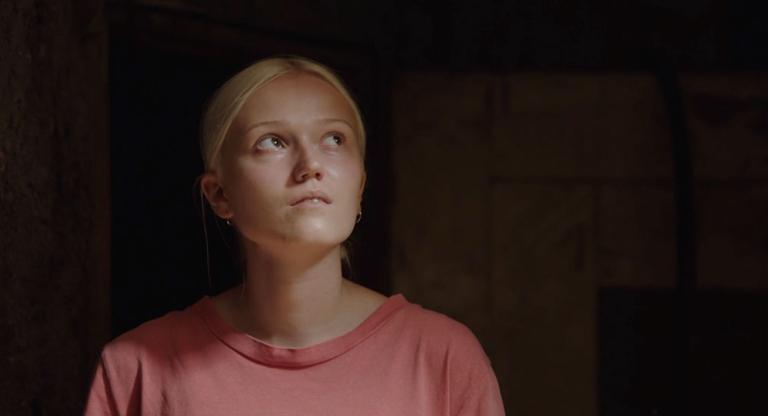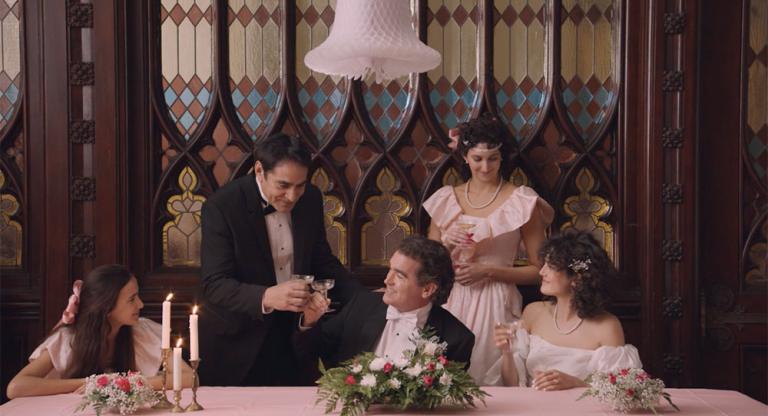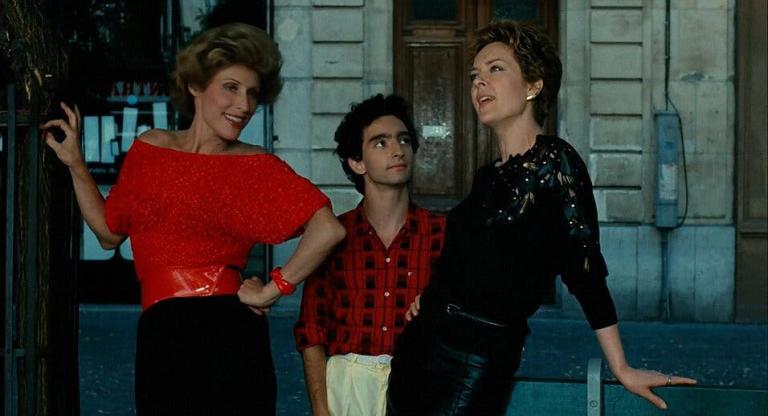Best known as Joachim Trier’s screenwriting partner on Oslo, August 31st (2011), Louder than Bombs (2015), and The Worst Person in the World (2021), Eskil Vogt has carved out a fascinating directorial career in his own right with back-to-back low-fi genre thrillers Blind (2014) and now The Innocents (2021). His latest is a peculiar and disturbing film, which plays with the current fascination with superheroes and superpowers, but in a singularly introspective manner. Vogt takes a deliberately reticent approach, with carefully composed camerawork and a subdued soundscape revealing a tranquil suburban apartment complex where four children begin to realize that they have a connection with each other.
This connection takes a dark turn as the kids tap into their inner powers that test their friendships and the lives of others, including their parents. The Innocents tangles the presumed innocence of childhood with deep moral questions. Vogt allows these characters, who are just beginning to experience life and magic outside of their homes, to cross the thin lines between good and evil, between heroism and villainy, as they discover themselves and their power in the world.
Soham Gadre: Along with The Innocents, you also wrote the script for The Worst Person in the World with Joachim Trier. Could you describe the difference in process and also approach to storytelling and ideas for when you're the sole director and writer versus when you're collaborating with Joachim?
Eskil Vogt: [Joachim and I have] been friends since our teens. We were friends before we started writing together and working together, just sharing a dream of making films, a love for films, hanging out, becoming best friends. And I guess we kept that attitude while writing. So it's not very professional, our way of working. We’re talking, and talking, and talking. Talking about life, talking about movies, talking about ideas. [It’s] like [a] psychoanalysis couch—sometimes he lies there, sometimes I do. And sometimes we just talk about movies, and whatever. And that informs the films that we make, in a way, those conversations.
And when I work alone, I don't have to talk that much. And I don't have to analyze everything. Because we kind of do—we're both very analytical. So we don't just talk about the ideas, we talk about what they express, what they mean, why we're drawn to them. Luckily, we know each other so well that we have kind of some [things] that we don't need to talk about, because we’re so in tune. But I'm even more intuitive, I think, when I write alone. I mean, of course, I'm analytical in phases. But I can say, “OK, I won't look too closely at this thing. I'll just work with it because I feel it's interesting, I feel it fits in somehow. And let's see where it lands.”
SG: Both The Innocents and also Blind [2014] blur the lines between reality and fantasy. The Innocents actually reminded me of Unbreakable [2000]. Somebody discovers that they have this special ability, and it affects the people in their daily life.
EV: What's great about that movie is that it's like, superpowers are real, but they are less spectacular and more low-key then in the myth and the fiction of it, which is a very interesting idea. I can see the similarities to The Innocents in that respect, that you keep everything on a more low-key level than those “go all out with the big explosion” kind of stories.
SG: I was wondering if there are any particular movies or books, or even real life events, that form the origin of this film for you.
EV: Maybe not the origin, but one of the most important influences is a manga called Dōmu [1980–1981]. It's by Katsuhiro Otomo . . . . Before Akira [1982–1990], he did a graphic novel called Dōmu, an amazing work that was very inspiring for this movie. It's the most important reference, I think, for this film, and people who know it will see similarities here and there. And even with the cinematographer, we studied his drawings. He creates really iconic compositions, but he keeps a sense of realism. He’s so detailed, but he chooses his details. So that's probably the most important reference.
Usually when I write stuff, I have a list of movies I want to revisit. But with this one, there weren't that many, because I became very aware quite early that there was a lot of stuff I wanted to avoid. I had this idea that I was making something original. And when I was comparing it, I felt like, “Oh, it really resembles all these stories about young people with supernatural abilities.” It can resemble those “kids are scary and demonic” kind of movies. But I felt, “No, it's not like that.” These supernatural stories about youth, they're more like allegories of puberty. They're about “Your body is changing, and weird stuff is happening, and webs are ejaculating, and you have to close the door, because you aunt is outside, and that kind of thing. And that's not my movie. My movie’s about childhood with a capital C. It has nothing to do with puberty yet. It's about the magic of childhood. That's why they have powers.
And then I would see those scary kids movies, and [say], “No, that's the opposite of what I want to do.” Because they are stories about adults looking at kids and being scared of them. . . . And I'm making a movie where I want to be with the kids in their inner circle and understand them, and the adults are in the background. So I [made] a decision: I won't revisit those [films]. I mean, I revisited some of them to see how they did the sound design and stuff later. But I watched movies about childhood, classics about being a child, and seeing how Tarkovsky did Ivan’s Childhood [1962], or how Victor Erice did Spirit of the Beehive [1973]. . . . Nothing to do with scary movies. But just how do they make it work with such young kids, and reminding me how magical it is when a child actor is present in a moment and you can see the emotion in their face and a thought pass. It's just magic. It's like, “Yes, I want to do that!” That gave me inspiration.
SG: This is the first time that you're working predominantly with children in your films. Most of your movies are centered around people in their twenties and thirties sort of finding their way through adulthood. How was it different this time working with children and a story that’s about children navigating their way through childhood?
EV: I don't want to think about what's difficult when I'm writing, so I just try to be open. There’s so many practical problems, or budget problems, or whatever—[so I] just keep that out. Then I end up writing a movie with four young kids and a cat. And people say, “Never work with kids and animals.” It's a big, big step, but we knew that would be difficult. So we put a lot of resources into the casting and spent time with the kids. I learned how to do it, and they learned how to do it. When the shoot came along, they were so great. They just nailed it every day. So it's not true to not work with kids, but avoid a cat. [We had] the best animal wranglers in Europe. A cat still doesn't do what it's told. Time passes very quickly when the whole film crew is waiting for a cat to jump off the chair and it's just sitting there licking its paws. You can't train a cat that way. Probably a dog is better.
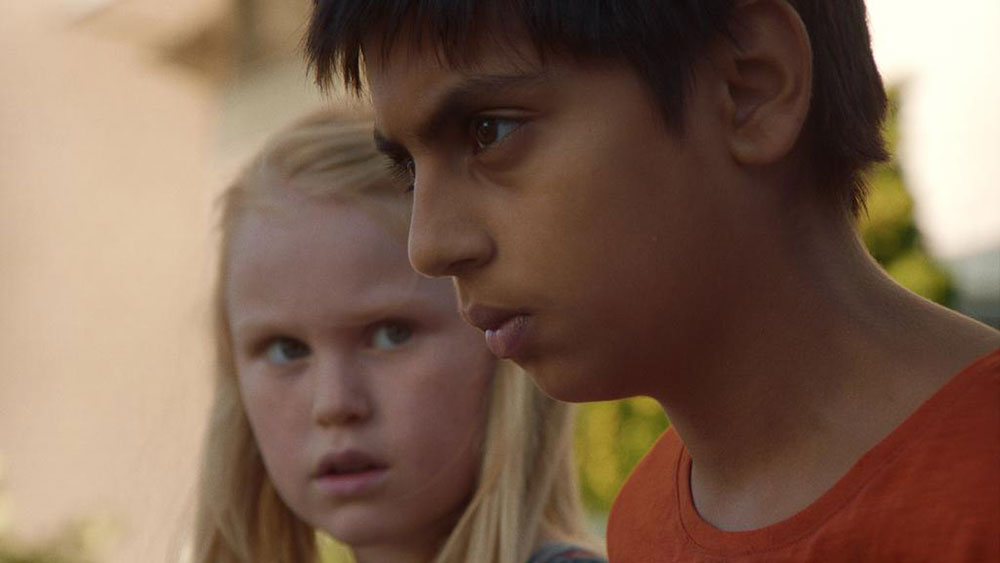
SG: Considering that the film has very frank depictions of violence, I was wondering what the kids’ reaction to those scenes were? How did they work with that, knowing that this gets to pretty dark places in some parts?
EV: We were concerned about that while we were preparing. Compared to other scary movies the level of violence in my movie is quite subtle, but the violence feels more real in some ways for some people . . . . Of course, I would never surprise them to get their reactions, they were always informed of everything. We discussed and talked. And they just understood perfectly the difference between fiction and reality and their character and themselves. And even the seven-year-old who plays Aisha [Mina Yasmin Bremseth Asheim]—she was talking about her character's motivation like a professional actress. They were very intelligent kids, [which is] probably why they worked in that setting. We chose them [because] they were very aware and very mature for their age. When we were shooting some of those difficult scenes, they had a blast. Stunts, and sometimes even some fake blood—they were like, “This is cool!”
I mean, they’re kids. And you shoot small pieces at a time, so we’d have thirty seconds or a minute of a take where they are terrified, and they're hyperventilating. And I would say “Cut,” and they would do cartwheels over to the sound engineer and have fun with him. And I would have to go, “No, no, we need another take!” And they would go right back into that fear and feeling because they're good actors and they’re kids. And kids are not method actors. They don't need to be in the mood for hours at a time. They can change the mood like that [snaps], you know? That's why kids are so fascinating to watch. They can go from anger to joy to sadness in an instant.
SG: A lot of movies that are centered around children tend to make children one-dimensional characters. And this film, especially from a moral standpoint, makes them very multidimensional. The morality is ambiguous. Was there ever a question—either while you were writing the script or when they were acting—about “Is my character evil? Is my character good?” Or was there an understanding that children can be cruel, but they can also be kind?
EV: Yeah, that was an ongoing discussion. And it was very important to me that they all understood that there were no evil kids there, that all the kids have bad impulses and good impulses. That's hard to navigate. I would talk to the boy who kind of becomes the antagonist. And I was really talking to him about, “I want you to play this role because I know that you could show him as a real person, as someone with feelings, and that you can show his vulnerability and his good impulses so that it would be harder for people to just say that he's the villain. Because he's not, you know. In that classical dramaturgic way he is, but I don't want people to cheer when he’s stopped. It's not that kind of film for me. And so I tried to make them collaborators in that the older kids would show bad sides and good sides and be complete human beings and that they all had moments where they were happy and good, and they all had more dark moments. And that would be the collaboration of it: There were no leads and no villains. There were just four kids trying to figure stuff out.
SG: In both of your films, Blind and The Innocents, disability plays a major role. How do you navigate that in your scripts and in the films?
EV: I'm kind of surprised when I'm drawn to it, for different reasons every time. What I do enjoy in storytelling is that you have prejudice against the character. You feel like, “Oh, she lost her sight. She's a victim, poor woman.” And then you understand, “Oh, she is completely fascinating.” Because she has this imagination, she has these cruel thoughts, these good thoughts, these sexual thoughts. She's a completely original person, and not the person you thought she was. And the same with the autistic, nonverbal child in this movie. Because of the supernatural fable we're telling, you can suddenly show some of what she has inside of her. And that means that her sister will never see her the same way again. She will know her and respect her in a completely different way. And I like that about storytelling. And I've done that also with an introverted teenager in a movie I wrote with Joachim called Louder Than Bombs [2015]. You think, “This person is so messed up.” He can't even say three sentences to his father. And then suddenly, you read something he’s written. And you say, “Wow, this kid has this imagination and this world inside of him.”
I love that because I feel there’s such a lie in storytelling often, that you have to have this arc of a character changing completely to have a satisfying story. I feel that's a lie. Because people don't change that much in real life. They might have moments of insight and small changes, but people kind of stay who they are. And I feel like it's more satisfying, even if the character doesn't change, that your perception of the character changes during the story. That’s something I come back to is [that] you never know, from the surface, what interior life a character has.
[I was reading about] an author’s experience with having autistic son, and something she called “regressive autism,” losing her son while he lost his capacity to speak when he was three or four years old. As a father, it was so traumatic to me to read about that. It kept coming back to me and haunting me until I thought, “Well, maybe this is part of the story.” I'm making a movie about the secret, closed-off world of childhood, and what's more secret and closed-off than a nonverbal child, right? So then I started to make that part of the story—doing a lot of research, talking to parents about it. Even though it's a supernatural fable where weird stuff happens, I wanted it to feel real and not do it in a gratuitous, easy way. And not making an “Oh, the [disabled] people are magic” kind of thing, because in my movie I think all kids are magical. So it's not that story. It was a fascinating world to observe and do research in. Autism is such a vague diagnosis . . . . There's no one symptom that all autistic people have. So they are very individually different, which is very important for people to know. It's very easy to have prejudice, but people are all very idiosyncratic, their own person in their own way, which is what fiction is great at describing.
The Innocents was a selection of New Directors/New Films 2022. It opens May 13 from IFC Films.
